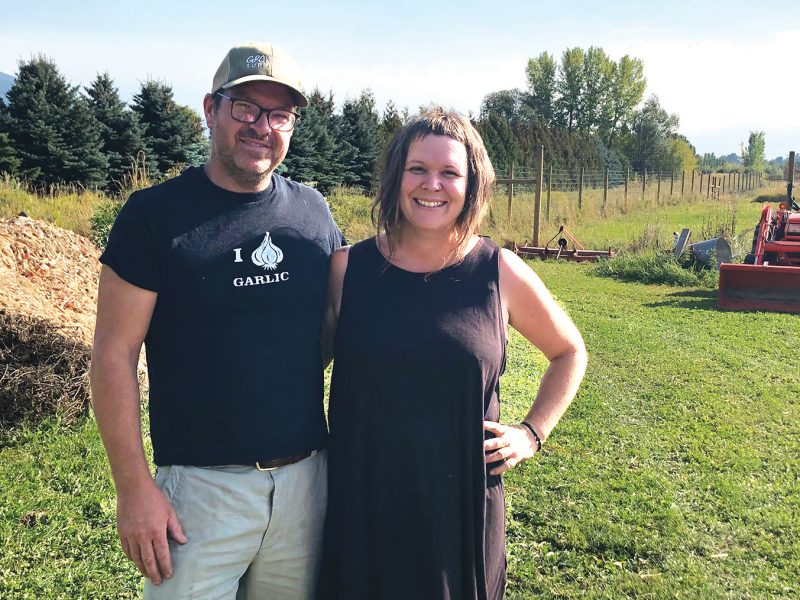CRESTON – British Columbia is one of Canada’s largest producers of garlic, a crop that is well suited to smaller farms since it does not require a great deal of land to support a profitable business.
Thistle Farm in Creston is an example of what can be achieved on just four acres with this much-in demand vegetable bulb. At a recent field day facilitated by the Kootenay & Boundary Farm Advisors and FarmFolk/CityFolk, farm owners Kip and Michelle Cantrell shared their success using mustard as a cover crop.
Where Thistle Farm differs from other local growers is its use of biofumigation, the suppression of soil-borne pests and diseases using plants that produce chemicals called glucosinolates. When glucosinolates come in contact with water and plant enzymes, they transform into another type of compound which gives mustard its biofumigation power. Mustard can deter many pests while preventing soil erosion and improving soil structure, provided a rigorous protocol is followed.
The Cantrells settled on their four-acre property in 2015 after working on farms across Canada, New Zealand and Australia for 15 years.
“We knew the science behind growing garlic,” says Kip, “but here on the Creston flats, the soil is fertile but fine like silk, and contains little organic matter. We adapted what we knew as we learned about the land, including building up the soil so that it drained better.”
He says they focused on garlic because it can be grown in a small area and sells well. It also doesn’t demand constant attention.
“There are times during the year where the crop requires little management,” he says. “This lets us do other things, such as making value-added products and some off-farm work in the winter.”
One of the farm’s early crops developed fusarium, a fungus that can live a long time in the soil and stops the flow of water and nutrients to the garlic bulb. To address the problem, the couple experimented with radish, oats, peas and buckwheat as cover crops, but had the greatest success with mustard, specifically the Caliente 199 strain which is bred for biofumigation due to its high levels of glucosinolates.
Incorporating mustard is a specific and time-sensitive procedure. It needs to be done before full bloom and before the mustard starts producing seeds, otherwise it can become a weed problem in the next season. Glucosinolate levels also go down quickly once mustard plants start producing seeds.
Initially the farm hired someone with a flail mower to incorporate the mustard into the soil. This year, the Cantrells purchased their own flail mower.
“The blades are like small hammers attached to a long spinning shaft that rotates at high speed, resulting in extremely finely cut plant material,” Kip explains. “The mustard needs to be mowed and tilled within 15 minutes – we use two tractors to do this – then irrigated as soon as possible. It’s important to wait two weeks after incorporating the mustard before planting the next crop to ensure maximum benefits from the biofumigation process.
“By using biofumigation, we’ve been able to reduce our previous four-year rotation to three which makes our production more viable,” adds Kip. “Mustard requires just nine to 10 pounds per acre while an alternative such as fall rye requires 100 pounds per acre. Now other growers are contacting us for information on garlic growing practices and drying and storage systems.”
Thistle Farm also grows shallots, onions, beets and carrots which are sold at farmers markets in Creston, Cranbrook, Nelson and Trail. They also sell their fresh and value-added products such garlic grinders and garlic scape salt grinders at the farmgate. Its long-term plan is to grow the farm to 10 acres, with fresh garlic remaining the priority.
“You can never grow enough garlic,” says Kip.


 BC Turkey names executive director
BC Turkey names executive director